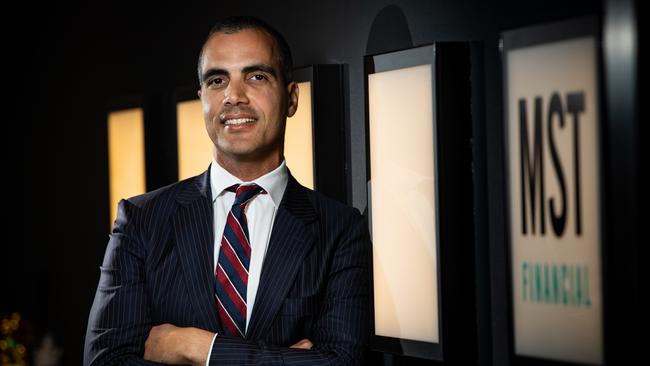Worst may be over as earnings trough emerges
Strategists are increasingly hopeful that Australian corporate earnings have passed their nadir, potentially supporting the sharemarket.

Strategists are increasingly hopeful that Australian corporate earnings have passed their nadir.
While the speed of any earnings rebound will depend on whether policymakers pull off a soft landing and deliver expected interest rate cuts, an improving earnings outlook may underpin the Australian sharemarket’s valuation after a 13 per cent rise in the S&P/ASX 200 index over the past few months to a record high near 7700 points.
As reporting ramps up, with about 94 companies or 40 per cent of the ASX 200 in terms of market capitalisation reporting this week, the early trends have been positive.
With about a third of ASX 200 companies having reported as of last week, expectations for June 2024 profits in aggregate have been downgraded this month by just 0.1 per cent, or $200m, to $148bn, according to MST analyst Hasan Tevfik.
After taking account of the fact that the Australian dollar has fallen by about 2 per cent this month and about a third of the ASX 200 profits base reports in US dollars, there’s been a 0.3 per cent upgrade. That’s much better than the average reporting season downgrade of 0.7 per cent.
For companies that had actually reported their results as of last week, it’s even brighter.
Earnings from that group were upgraded by 0.4 per cent before taking account of FX impacts.
Standouts include Boral – which received a takeover offer from Seven Group on Monday – as well as Origin Energy and JB Hi Fi, while some of the most disappointing results have been from Fletcher Building, South 32 and GrainCorp. On Monday, positive surprises came from Westpac, A2 Milk, Imdex and Reliance Worldwide, while Lendlease and Bendigo Bank were the main disappointments.

Thus, the trough in Australian corporate profits that Mr Tevfik predicted six months ago for the December 2023 half-year now looks to be a reality.
“Current forecasts are for ASX 200 earnings per share to trough during the December 2023 period with profits contracting 8 per cent,” he said.
“As we look ahead to June 2024 expectations are for ‘less bad’ EPS growth.
“Much of the weakness has been in the commodity producers but there has also been a moderation in the pace of the industrials profits too.
“Expectations suggest there will be an acceleration beginning in the current half and the solid start for the current reporting period helps confirm this.” Morgan Stanley Australia equity strategist Chris Nicol said an “earnings trough is being found”.
“At the aggregate, updated underlying stock estimates are yet to flow through and we have observed minimal changes,” he said. “That said, the early reads and general beats over misses suggest to us that an earnings trough has likely been found.”
Macquarie Australian equity strategist Matthew Brooks said that while the share of misses tended to rise towards the end of results season, February “could still end up as one of the rare results seasons where there is a net positive surprise”.
UBS strategist Richard Schellbach said Australian companies were “learning to live with heightened cost pressures and interest rates”.
“At this stage we would have to say that their response to the tough macro environment has been both stoic and impressive,” he said, pointing to cost controls that have boosted profit margins.
“CEOs seem to think the worst may be behind them, with a positive skew showing through in both outlook statements and trading updates,” Mr Schellbach noted.
“Although companies are usually better at picking the bottom of the cycle than the top, we are wary that the dovish sentiment which has flowed through rate markets over recent months could be flattering sentiments in the C-suite. We understand that investors like to ‘look through cycles’, but this optimism does strike us as something of a ‘twilight zone’, and one where we would be wary of stock prices being left in an air pocket post this results period.”
MST’s Mr Tevfik also cautioned that investors shouldn’t expect a sharp recovery in ASX 200 profits because the recent profit downturn had been “less severe than those in the past”. But where he does see a potential ‘‘V-shaped’’ recovery is in small cap profits.
Small Ordinaries EPS is expected to have contracted 26 per cent during the 12 months to December 2023. Current forecasts are for growth of 12 per cent for the 12 months to December 2024.
“A sharper downturn in small cap EPS is a reason this part of the equity market struggled over the past two years, and a sharper recovery in EPS should be a reason why small caps outperform in 2024,” Mr Tevfik said.
As of last week analysts had raised their industrials sector EBITDA margin forecasts by 8 basis points to 17.7 per cent and net margin forecasts rose 6 basis points to 7 per cent.
“While companies are guiding to a weaker sales outlook, it appears they are having more success in managing expenses with a considerable downgrade for operating costs,” Mr Tevfik said.
The biggest industrial net margin upgrades were from Boral, AGL and Origin, while the capital-light business models of REA, Seek and Car Group have suffered the biggest margin forecast declines.
Dividends have also been upgraded during the current reporting period, with the consensus estimate for ASX 200 dividends rising 20 basis points or $200m to $93.5bn.
These upgrades have so far been concentrated in commodities and industrial companies while there have been small downgrades for the financials so far.
In percentage terms the biggest upgrades have been for Beach Energy, Origin, Nick Scali and JB Hi-Fi.
The single biggest downgrade has been from Fletcher Building, which is in capital preservation mode and says will sell assets.
ASX 200 companies have also announced four new buybacks worth $468m. Reliance Worldwide revised its distribution policy to a mix of 50 per cent dividends and 50 per cent on-market share buybacks, a move that “appears to signal internal thoughts on valuation”, according to Citi.
“Aussie companies are already buying back their stock at a healthy clip,” Mr Tevfik said.








To join the conversation, please log in. Don't have an account? Register
Join the conversation, you are commenting as Logout